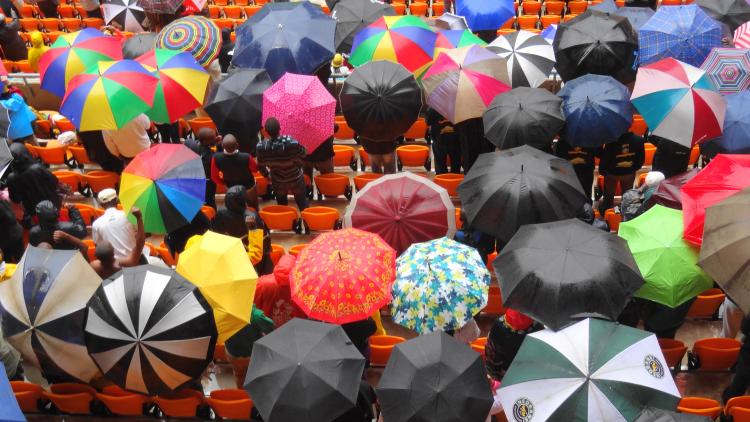Ming Yang

Key information
- Roles
- School of Languages, Cultures and Linguistics Researcher
- Qualifications
-
BA in Translation and Interpreting (Beijing International Studies University)
MSc in Translation Studies (The University of Edinburgh)
- Subject
- Languages
- Email address
- 713504@soas.ac.uk
- Thesis title
- Cultural Insensitivities or Ideological Conflicts: Examining Controversial Marketing Campaigns in China
- Internal Supervisors
- Dr Yan JIANG 蔣嚴 蒋严 & Professor Nana Sato-Rossberg
Biography
Ming Yang is a PhD student in the Department of Linguistics at SOAS, University of London.
Her current research interests include translating cultures, marketing translation, creativity in audiovisual translation, and political translation. She obtained a BA in Translation and Interpreting from Beijing International Studies University where she took intensive and extensive training sessions in practical translation, sight translation, consecutive interpreting, and simultaneous interpreting.
Her undergraduate program also provided her with opportunities to put what she had learned in class into the real world – interpreting for all walks of life, which motivated her to think about what is beyond language skills when we analyze translators' and interpreters’ performance in various settings. Her undergraduate dissertation analyzed humor translation in an American comedy named Why Women Kill from the perspective of functional equivalence and illustrated how culture, history, and society affected the way that Chinese translators interpret humor in American TV shows.
During COVID, she moved to Edinburgh where she obtained an MSc in Translation Studies. Courses including Translation and Technology in the Workplace, Research in Translation Studies, and Introduction to Interpreting Studies equipped her with both the theoretical basis and practical skills (proficient use of computer-aided translation tools and data analysis software) of delivering accurate translation and conducting qualitative and quantitative research in Translation Studies. Her MSc thesis drawing on polysystem theory investigated the challenges and possible strategies of translating taboo love from English to Chinese. Before starting her PhD, Ming worked as a screenwriter and director for a history TV show named Archives in China.
Her works were mainly focused on American political history, the Korean War, traditional Chinese culture, and new media. She also undertook many other internships in tech companies and media agencies. Having studied and practiced translation and interpreting for years, Ming sees translation and interpreting as a discipline that can reflect how people from various backgrounds interpret our increasingly diversified world and how that process evolves as time goes by.
Key publications
Ming has presented research at the following conferences:
Yang, Ming. 2024. “Overreactions or Justifiable Anger: A Case Study of Luxury Brands' Controversial Marketing Campaigns” The Consortium of African and Asian Studies' (CAAS 2024) Annual Symposium. Columbia University, US.
Yang, Ming. 2023. “When Peking Opera Meets Scotland: What to Expect When (Re)translating Culture for China’s State-owned Media Agencies?” Translation and Interpreting Studies Conference (NCLTIS Conference 2023). Newcastle University, UK.
Research interests
I am intrigued by challenging translation and interpreting tasks, especially those that are deemed as the so-called “untranslatability” by the public. A series of questions have been hovering in my mind since I first studied and practiced translation and interpreting in 2016. What am I translating? Languages, ideas, cultures, ideologies, or anything else? What translates and interpreting is challenging? Is it related to cultural differences, insufficient language proficiencies, ethical considerations, political sensitivities, or historical issues? What kind of efforts do translators and interpreters need to make to resolve these problems? If they fail to do so, what kind of consequences, debates, or even conflicts will they trigger? Is translation and interpreting only limited to language switching? Can it be expanded into a broader field that includes things like intersemiotic? Is there any invisible translation process that is sometimes neglected by us?
For example, when Chinese people are trying to understand what it means when the British use the word “interesting”, they may consider the context, which can be the specific occasion, location, or timing but can also be the facial expressions, body language, the tense between interlocutors, the topic of their previous discussion or even the broader context such as international relations or British culture. Such an invisible translation process awaiting a systematic theoretical explanation also suggests the lack of research into the essence of what translation is and what makes it challenging.
Though there are “mountains” of translation challenges in this every-growing and diversified world we are living in, I take a closer look at those without delicate handling may offend ordinary people, especially people whose mother tongues are not English, which can also be seen as my way to participate in decolonization. My current research topic is focused on international brands’ marketing campaigns in China. Some luxury brands featured the “slanted eyes” of Chinese models in their advertisements triggering heated debates on social media. Media agencies from China and English-speaking countries covered a series of similar controversies in different ways with contrasting stances and public reactions.
My research drawing on newly-released pragmatics theory and data scraping software aims to investigate the cause and effect of controversial marketing campaigns in China and how different parties of interest “translate” or “interpret” culture-specific signs in controversial marketing campaigns. Despite the prior literature that often attribute such controversies to cultural differences, I argue that it can go beyond culture, reaching the politics of language and translation – who gets to decide what beauty is for Chinese consumers and what kind of public image Chinese culture should have or project in the international community?


